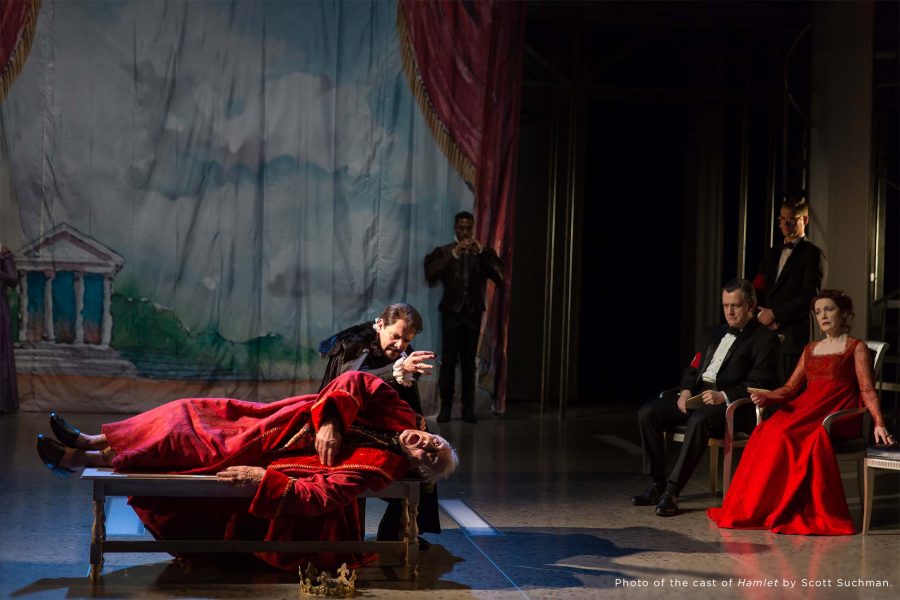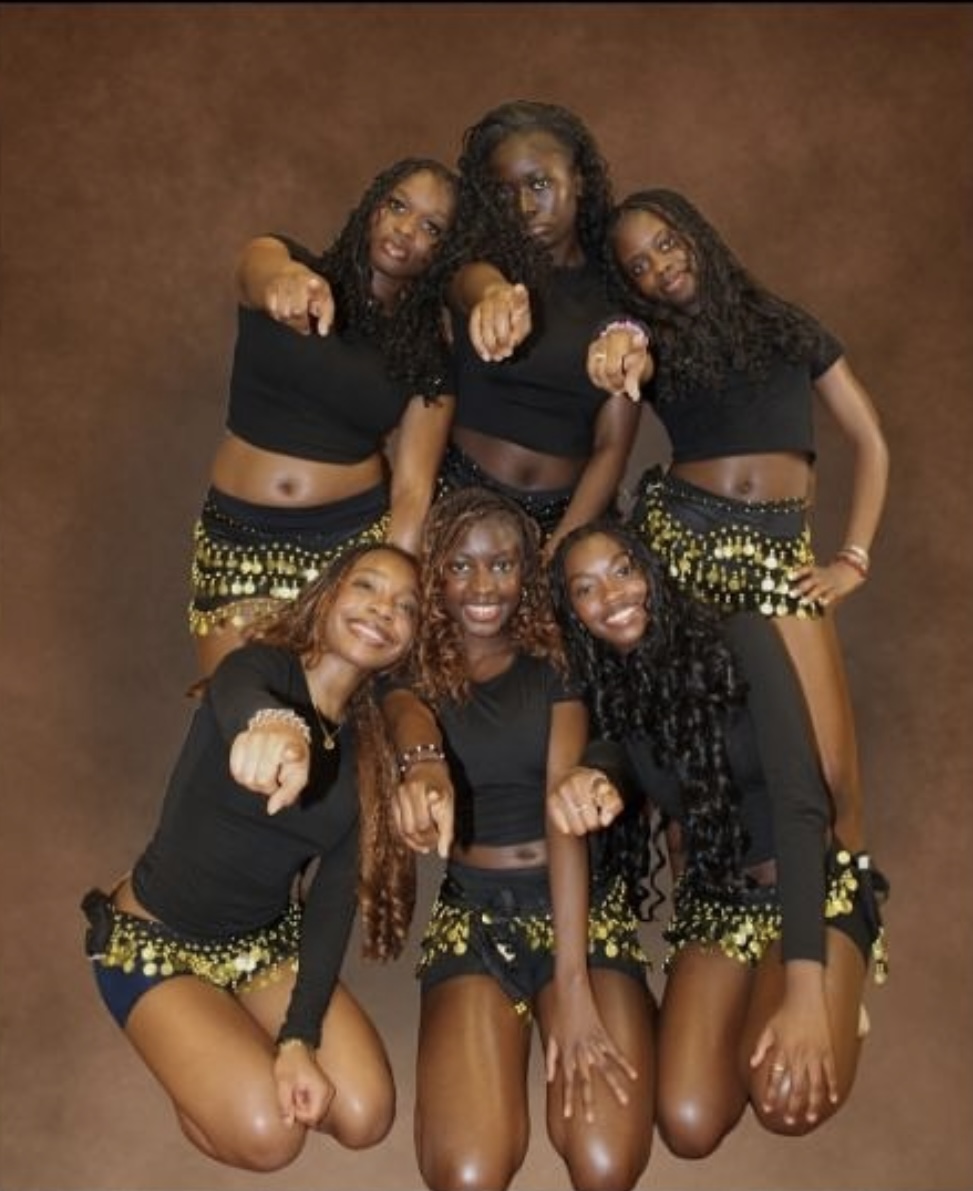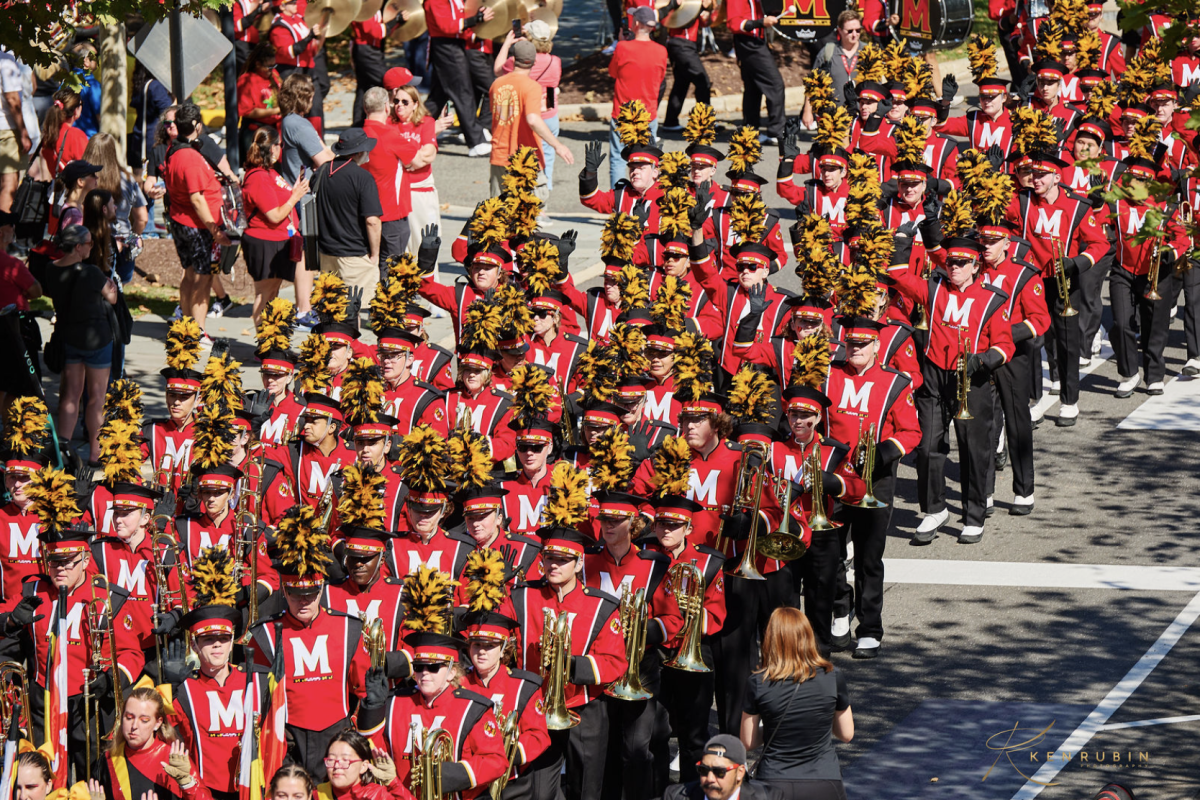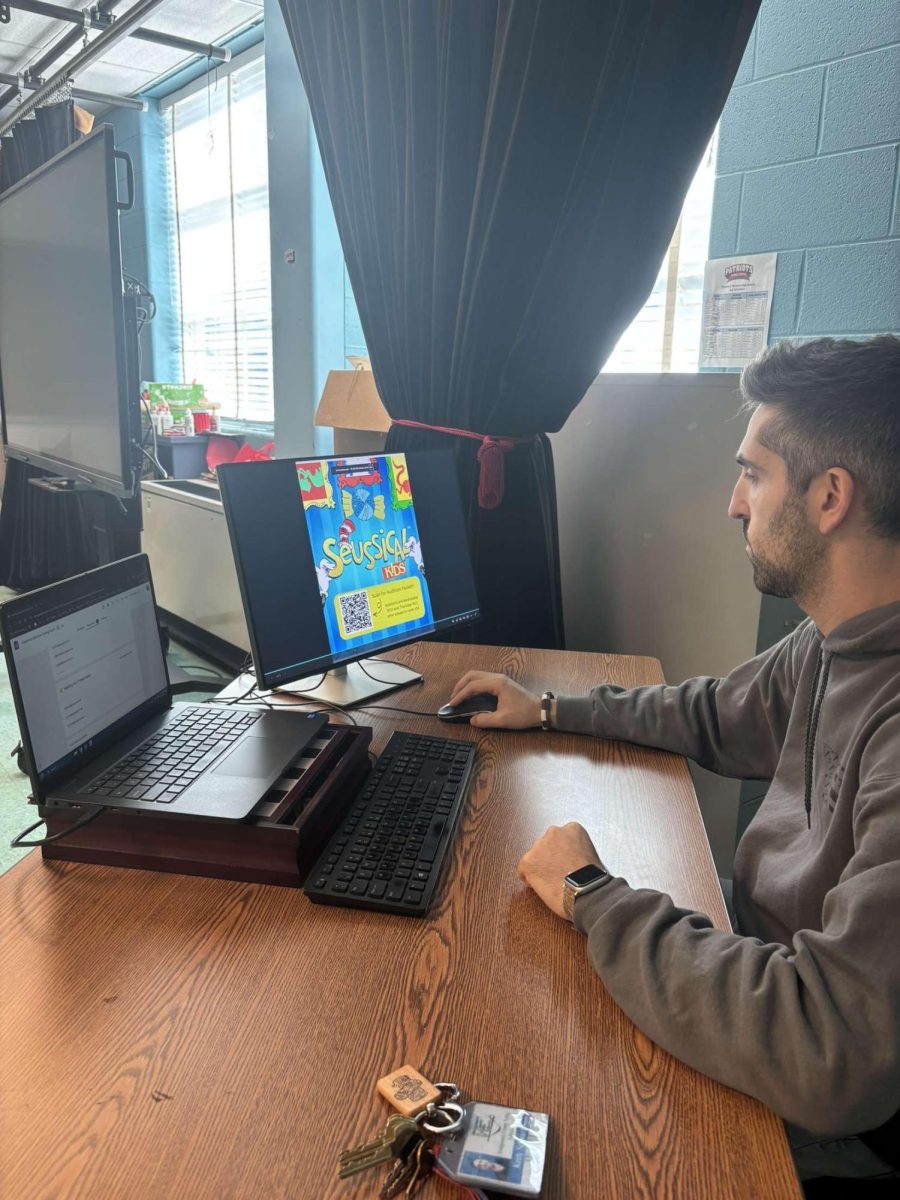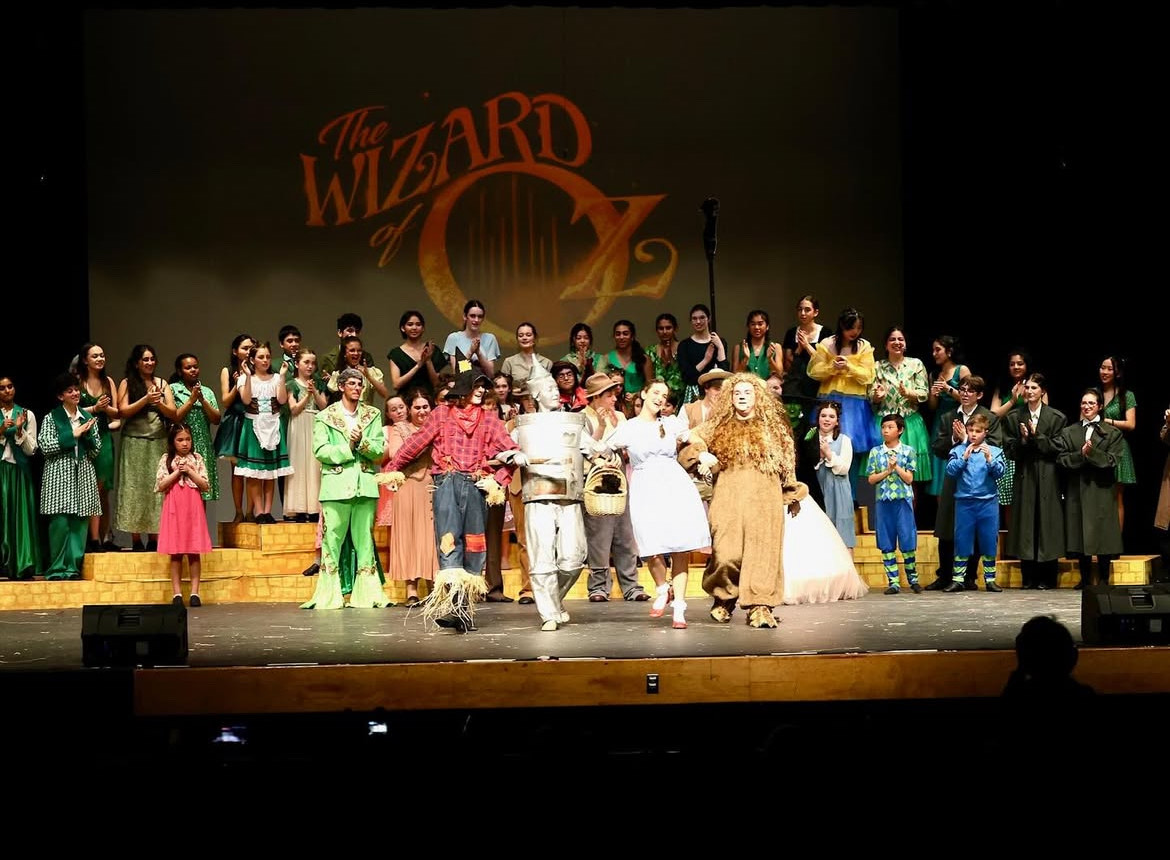A vintage movie light box sign hangs from ceiling. The sign is dead center, and spans about half the stage. It hangs eerily by itself, almost intolerably blinding against the black backdrop of utter darkness shrouding its surroundings. The sign is bold, bright, and mysterious, uncannily fitting for one of the most complex and alluring Shakespeare characters. The sign reads “Hamlet.”
Shakespeare Theater Company’s production of Hamlet began previews on Jan. 16, with opening night on the Jan. 22. The run was recently extended to March 4. Broadway’s Michael Urie plays the troubled Hamlet, under the direction of Michael Kahn.
Perhaps the most intriguing, thought-provoking, and enlightening aspect of the play is the political commentary Kahn incorporates, using the set designed by John Coyne. Dangling innocently from the wall are multiple security cameras, focused inward on the stage. At one point, Hamlet, aware of the cameras, climbs up a pole and yanks one off the wall proclaiming “now I am alone.” This question of if and/or when we are truly alone with surveillance cameras everywhere is ingeniously incorporated.
TV screens showcasing footage from the cameras allow Claudius (Alan Cox) and Polonius (Robert Joy) to track whomever they wish, including their sons. Photo propaganda of Gertrude and Claudius flash on the screens as they participate in a press conference of sorts. It was clear that the journalists and staff members in attendance only applauded for fear of what would happen if they voice dissent.
This “Big Brother” regime warns of the dangers of authoritarian government. In an Orwell-esque fashion, Claudius has the Player King (Keith Baxter) shot by two officers for participating in Hamlet’s guilt provoking play. Claudius calmly and coolly watches from the balcony as the murder takes place. Seeing a king kill a subject for being out of line with his political views is chilling.
In addition, Gertrude and Claudius’ hand-holding seems unnatural and reluctant. Claudius invites Gertrude to be by his side because he has gained power by association with the queen. Kahn’s clever commentary on the dangers and ethicality of political couples and alliances is striking, and brings to mind current political couples, such as the Clintons.
The surveillance orientated authoritarian setting paints Rosencrantz (Ryan Spahn) and Guildenstern (Kelsey Rainwater) in a less flattering light, as their compliance to Claudius’ commands make them seem more like backstabbing spies than caring friends. Yet another modern makeover is the portrayal of the watchmen as police officers, who first catch sight of the dead king’s ghost on security cameras. Casually sipping coffee and conversing in Shakespearean language, the officers draw many laughs.
Furthermore, the actors’ emphasis on lines charged with political meaning struck a chord with me, especially in the current, chaotic political environment. Alan Cox broke the fourth wall when he delivered the line “Madness in great ones must not unwatched go” and “his liberty is full of threats to all—. To you yourself, to us, to everyone.” Cox’s direct and punctuated deliverance of the lines intensifies the politically charged message; his appeal for the audience to not let insanity in any political leader escape notice, for the safety of all, rings clear in Harman Hall, which rests in heart of the Capitol.
The technologically up to date setting also incorporates smart phones, with Hamlet and Ophelia sneakily texting each other like two shy teenagers afraid to admit their feelings face to face. Hamlet also resembles an active modern day participant at events, capturing pictorial evidence of Claudius’ guilty guise during the play on his phone. Spy gadgets, including a recording book Ophelia carries during her set-up meeting with Hamlet, are also featured.
The icing on the cake is Urie’s moving portrayal of Hamlet. Urie balances Hamlet’s melancholy darkness with humor, which is achieved in the deliverance of certain lines. Some lines are delivered with haughty sass and princely command. Others are mumbled with utter indifference, and some words are delivered with taunting accusation.
Urie’s awkward spasms of movement creates an anxious, confused, distraught teenage Hamlet who is petulant at times, but also mature beyond his years. Urie creates a complex character who can be childish in his jester costume for the play, yet unnervingly serious as he weighs the pros and cons of suicide.
Urie looks like a moody teenager with his skinny jeans, zip up hoody jacket, and tendency to sulk, slouching in the corner. Urie liberally uses mannerisms to express Hamlet’s angst and unhappiness, including flailing arms, frustrated gestures, impatiently running his hands through his hair, and blurting out phrases, almost slurred in his haste. Urie skillfully embodies Hamlet’s adolescent frustration with others constantly spying on him, as well as his explorations as a young man with trust, love, betrayal and purpose.
Being not nearly as rebellious as Hamlet, Ophelia’s journey explores the dangers of being too naive and cooperative, as she’s used by others to trick and harm Hamlet, whom she loves. Ophelia’s blind trust results in her own heartbreak and destruction; her sad demise also serves as a warning against allowing others to make your decisions.
I particularly enjoyed the playful fencing scene at the end of the play. Urie and Paul Cooper (Laertes) sported matching grey fencing jackets with a side zip, and grey helmets. Hanging overhead are two TVs acting as scoreboards, with one reading “Laertes” and the other “Hamlet.”
Shakespeare Theater Company’s production of Hamlet is thought-provoking, promotes involvement and awareness in the political realm, witty, and left me pondering a question we all must grapple with sooner or later: “to be or not to be?” If you appreciate food for thought, and the thrill of live theater, experience Hamlet at Sidney Harman Hall before it closes on March 4.
Rachel Wei
Editor-in-Chief


